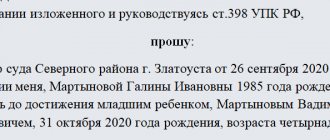The time period for the judgment to enter into force depends on which court issued it. If the case is considered by the district court, the verdict comes into force in criminal cases when the time for appeal ends, and the conclusion of the appeal is valid from the moment of proclamation. Difficulties with calculating time limits arise not only for applicants, but also for court employees, so it happens that citizens are unreasonably refused to accept applications.
It is advisable to stay within the limits when filing a complaint. It will be extremely difficult to restore lost time, given the formal approach of the courts. Only valid reasons, confirmed by supporting documents, are grounds for reinstating the deadlines.
To appeal a verdict, you must strictly follow the procedure: draw up a complaint in a certain form, collect evidence, meet deadlines. Even if a person is 100% right, but he has no evidence or the procedure is violated, then the chances of an appeal are reduced to a minimum.
On the competence of the court at the stage of execution of the sentence
Once the indictment is finalized, several issues arise that are within the jurisdiction of the court. The court decides the following issues:
- Decides whether there are grounds to postpone the execution of the sentence. For example, a valid reason for obtaining a deferment is the convict’s pregnancy. But granting a deferment is the right of the court, and not its obligation. To make a decision, the circumstances of the case, the personality of the convicted person, and other factors are assessed.
- Checks whether there are grounds to exempt from punishment. You can be released from sanctions if the convicted person is sick, and this illness prevents you from serving your sentence completely or for some time.
- Changing the conditions in which prisoners are held. The decision is made not by the court alone, but jointly with the management of the correctional institution. To make a decision, it must be approved by a commission of observers or a commission on juvenile affairs.
- Execution of a court decision. Includes enforcement of the sentence, resolution of procedural issues and control over bringing the conclusion into force.
The full range of issues that fall within the competence of the court is enshrined in Art. 368 of the Criminal Procedure Code.
Powers of the courts
Justice in Russia is administered by four courts, each of which has its own powers:
- The first of them considers the case on its merits: examines the evidence, listens to the testimony of the parties. Based on the results of the consideration of the case, a verdict is made on whether the person is guilty and the punishment is determined.
- The appeal reviews those decisions that have not yet entered into legal force.
- Cassation examines the decision-making regarding its legality. Cassation judges examine the written materials of the case, but do not analyze the evidence. Therefore, new sentences are not imposed in cassation. By way of supervision, it is examined whether court decisions that have already received force comply with the law.
The basic principle of the judicial system is strict hierarchy and subordination. If an error has crept into the court decision, the case may be returned to the lower court for retrial.
The Supreme Court left without a robe the judge who rewrote the verdicts after the announcement
Yulia Davydova, judge of the Shatura City Court of the Moscow Region, considered civil and administrative cases from 2007 to 2020. In March 2020, she notified the chairman of the court, Inna Gulchenko, about her husband’s new position: Vitaly Davydov became deputy head of the Shatura administration. To eliminate a conflict of interest, Davydova’s specialization was changed - now she had to consider only criminal cases and cases of administrative offenses.
She announced two years, and then added two more
Within a year after Davydova changed her specialization, many complaints accumulated against her. 4 verdicts were appealed, 2 of them were overturned, and even with private rulings. Davydova changed sentences after announcement, violated the rules of audio recording, did not put on a robe, groundlessly postponed hearings and scheduled hearings in different cases at the same time.
The Higher Qualification Court approved a criminal case against a judge of the ASGM due to a bribe of $50,000
For example, on September 11, 2021, the judge announced that she had imposed two years of suspended imprisonment; the same figure appeared in the copies of the verdict that the parties received. On September 15, the case was handed over to the office. But on September 21, the state prosecutor filed an appeal. The prosecutor argued that the judge unreasonably imposed a sentence below the lower limit. After this, Davydov, referring to Art. 397 of the Code of Criminal Procedure, issued a resolution to correct a typo in the copy of the verdict - increased the punishment to four years. And she dated this act on September 11, 2021. But the secretary recorded the announcement of the new verdict on her phone on September 21st, not September 11th. An appeal later overturned the verdict due to a contradiction between its text and the copies that the participants in the case received. For Davydova, the case ended with a “private owner.” This is not the only case of a verdict being changed after announcement. In several other sentences, Davydova corrected articles of the Criminal Code, the calculation of the amount of punishment, and an indication of relapse.
And sometimes the judge worked according to civil procedural rules - she announced only the introductory and operative parts of the verdict, although the Code of Criminal Procedure obliges it to be read out in full. Violations of audio recording were due to the fact that such recording needs to be done using special equipment. And Davydova’s secretary recorded everything on her phone. And sometimes there was no audio protocol at all.
Dangerous friendship and an amended resolution: how the day of complaints went at the Higher Qualification Committee
Chairman Gulchenko identified all these violations at the end of 2020, when a report on the work of the court was being prepared. She appealed to the regional council of judges, and that appealed to the KKS of the Moscow region. The qualification board decided that Davydova grossly and systematically violated the Code of Criminal Procedure and at the beginning of 2021 terminated her powers ahead of schedule and also deprived her of her qualification class. In March, the legality of this decision was confirmed by the HQCC (for more details, see “Dangerous friendship and an amended resolution: how the day of complaints went to the HQCC”). Then Davydova appealed to the disciplinary board of the Supreme Court.
"Resolute" sentences
On July 13, Davydova personally came to the Supreme Court to fight for her powers. And the representative of the KKS of the Moscow region, Yulia Artemyeva, connected via video conferencing. The case was considered by the “troika” chaired by Sergei Rudakov.
The ex-judge insisted that all her violations were unintentional and occurred at the very beginning of the change in specialization. Davydova explained that she was sick with coronavirus from March to May, and then was on vacation. As a result, she began to consider criminal cases only in July 2020. And before that, for more than 13 years, she dealt only with civil and administrative disputes.
“I turned to the chairman of the court so that she would send me to advanced training courses and give me a supervisor in connection with the change of specialization. But they refused me."
According to Davydova, she had no disciplinary sanctions, none of the participants in the process complained about her. The ex-judge suspects Chairman Gulchenko of bias. Where it came from is unclear to Davydova. After all, she did her best to help the new chairman get up to speed, and the boss, according to Davydova, promised her the deputy chair.
The former judge also complained about the high workload. In three months, she received 75 criminal cases, although other judges consider 140 cases per year. In addition to criminal cases, according to Davydova, the chairman of the court also gave her disputes about the execution of “civil” decisions, although other judges in criminal cases did not deal with such issues.
The judges of the Supreme Court discussed in detail with Davydova all her mistakes.
— In the criminal cases against Motorin, Popkov, and Stenin, only the introductory and operative parts of the sentences were announced. Do you agree with this? — Sergei Rudakov clarified.
— Yes, at the court hearing I announced the introductory and operative parts of the verdicts in order to save working time. But she did not attach the “resolution” verdicts to the case materials. “I issued the verdict in full on the same day,” Davydova justified herself.
— In what cases does the court have the right to announce only the introductory and operative parts of the verdict? — Rudakov delicately clarified.
“Only if he considers cases involving minors... It is provided for in the Code of Criminal Procedure... Now I simply cannot link to the Code of Criminal Procedure...” Davydova became agitated.
“I agree that such procedural “simplification” is unacceptable. But... The sword does not cut off a guilty head.”
“And you are also accused of administering justice without a robe in several cases,” Rudakov recalled.
These were “adjourned” court hearings, Davydova insisted. Even before the trials began, it was clear that they would have to be postponed. Then the prosecutor, who was supposed to participate in them, asked “to come over later and record everything in one take.” The judge did not put on a robe for the double.
But no arguments saved her. After a lengthy meeting, the disciplinary board refused to return Davydova’s powers.
- Ekaterina Korobka
- Supreme Court of the Russian Federation
When does the sentence take effect?
How long the period for appealing a verdict should be depends on which court adopted it: 10 days from the date of the decision are given for filing an appeal and one year for filing a claim in cassation or supervision.
The countdown begins the day after the verdict is pronounced. The time for appeal ends in the last twenty-four hours of the period. If a cassation or appeal was filed, and the verdict is not overturned, then it becomes valid from the date of adoption of the cassation ruling. The verdict of the appellate court becomes valid as soon as the period for appealing in cassation has expired. Until the court verdict receives legal force, the relatives of the convicted person can come to see him.
Important! The deadline for execution of the court decision is immediate if the person is acquitted. In the hall where the trial is held, the defendant is immediately released from custody.
The well-known and declared period for appealing a court verdict or other decision of a court of first instance is 10 days. There are several points in this issue that are not quite clearly interpreted.
It is quite clear that for a convicted person in custody, these 10 days begin to expire from the moment he is given a copy of the verdict.
For everyone else, including criminal lawyers, 10 days expire from the date of the verdict. It is generally accepted, although not controversial, that the day the verdict is pronounced is the day the verdict is announced. That is, the verdict was announced - and regardless of whether you have the text - your 10 days begin to expire. Already Article 310 of the Code of Criminal Procedure of the Russian Federation allows the court to pronounce only the introductory and operative (conclusions) parts of the sentence. At the same time, what is important for appealing is, first of all, the descriptive and motivational part of the verdict, in fact, where the court explains the reasons for the verdict and the evidence of the decision made. Within 5 days, you will, of course, be handed the verdict (although in practice it has happened that the full text of the verdict was handed over much later). However, even in this situation it is clear that your legislator actually “ate” five days to appeal.
But this is not the most interesting thing. What is interesting is the practice and legal understanding of our courts of procedural deadlines. Let’s assume that the court’s verdict is passed on December 31, on the eve of the New Year holidays. Immediately after the end of the holidays, on January 11th, YOU submit your appeal to the court. And here you will find out that you missed the deadline for appealing the verdict. You are in shock, trying to make up for the missed deadline. And whether you will succeed is unknown. This story is from real practice. Indeed, Chapter 17 of the Code of Criminal Procedure of the Russian Federation, headed by Article 128, does not contain a single mention of the fact that non-working time (holidays, weekends) is not counted when calculating deadlines. There is a slight hint that when calculating the terms of detention (house arrest, stay in a medical organization), non-working time is also included in these same terms. And we must guess that non-working time is not included in the remaining periods. However, this is not so, the Code of Criminal Procedure of the Russian Federation is a mandatory law and is not subject to broad interpretation.
It becomes easier if the 10-day period expires on a weekend or holiday. In this case, you can take your time and send your complaint the next business day.
In any case, the main advice: submit your complaint on time, and even with a small margin. If you do not have the full text of the sentence, submit a short appeal, stating your disagreement with the sentence and be sure to note the absence of the full text of the sentence. A short appeal - there is no such concept in the Code of Criminal Procedure of the Russian Federation, but its official filing (to the office, with a mark on the second copy) will help you “stake out” the deadlines. As a rule, filing a short appeal forces the court to hurry up and serve you with the full text of the verdict.
If you do not have time to personally come with a complaint to the court, send the complaint through the nearest post office. Don't forget to send a letter with the notification (preferably both the letter and the notification were registered) and receive the corresponding receipts with the date of departure. If you are in custody, submit a complaint to the administration (operational part) of the detention center, if in a hospital - to the chief doctor (or to the office of the relevant medical institution).
When reinstating a missed deadline for valid reasons, you will encounter a lot of problems. Procedural legislation does not contain rules explaining what are valid reasons for missing procedural deadlines. The analogy between the criminal process and other norms of Russian law is not permissible. And therefore, the courts interpret the validity of the above reasons in whatever way they please. Valid reasons will be the inability to file a complaint due to medical conditions (medical certificate, certificate of incapacity for work are required), natural disasters (in this case, forest fires in the area are not considered). In other cases, the courts may consider the fact of illness of a child (certificate required), death of close relatives (although this is far from a fact), fire in a house or apartment (certificate required) to be valid reasons. The absence of the full text of the verdict in your hands, a business trip, participation in another trial (even if the trial is in another location) will not be considered valid reasons. There have been quite exotic attempts to find valid reasons to justify missing a deadline - for example, refusal after a verdict from the services of a lawyer and the lack of a new lawyer, legal illiteracy, a nervous breakdown from scandals in the family, a wedding and honeymoon, moving to a new place of residence, divorce from a spouse and a nervous breakdown in connection with this, a change of location by the court, etc. The court, even on these grounds, can restore the period of appeal. It depends on whether you can prove that you wanted to appeal the verdict, but you did not have a real opportunity to exercise your right.
If you still missed the procedural deadline for appealing, you need to restore it. How - read here.
Your problems are often frightening in their complexity and intricacy. You should not despair and need to call
+7
Our specialists will analyze your problem and develop ways to resolve it in accordance with your wishes, the real state of affairs, the practical experience of our employees and current legislation.
Good luck and success.
What difficulties may arise
Ten days after the conclusion came into force, the decision is executed. The execution of the decision takes three days. But this process does not always go smoothly; sometimes difficulties arise:
- The guilty person ignores the obligation to comply with the court decision. After the sentence comes into force, the convicted person is required to pay a fine. The period for paying the fine is thirty days from the date the decision enters into legal force. If the guilty person fails to comply with the court’s conclusion, the bailiffs will handle the collection. Based on the decision, they have the right to write off the amount of the fine.
- Circumstances arise that make it impossible to carry out the court's verdict. For example, the illness of a convicted person does not allow him to be required to serve a sentence (imprisonment). The law does not specify which diseases provide this opportunity. Therefore, the judge makes a decision at his own discretion, guided by medical documents. If doubt arises that the medical report is legal, a special examination is appointed. When the financial situation of the convicted person does not allow him to pay the fine immediately, the court may grant a deferment. The time for deferment starts from the moment the judicial opinion becomes effective.
- Release from punishment. If a law is passed that decriminalizes an act, the judge will consider mitigating or eliminating the sentence for the person who was sentenced.
Appeal against a conviction. What should you pay attention to?
When the trial court announces a verdict that in 99.5% of cases indicates the defendant is guilty (according to the Judicial Department of the Supreme Court), the so-called appeal period begins. This means that the verdict already exists, but is considered not to have entered into legal force. Although, if the accused was chosen a preventive measure not related to imprisonment, and the verdict gives him a real term, then the convicted person (and the status of “defendant” changes to “convicted” after the verdict is announced) is taken into custody right in the courtroom and goes to a pre-trial detention center.
The appeal period lasts ten days. At this time, the defense and prosecution have the right to appeal the verdict to a higher court. If this does not happen, then after the expiration of this period the sentence comes into force.
It’s a strange thing, but many convicts believe that if they appeal the verdict, the courts may get angry and give them even more time to serve. Of course, this is completely wrong. According to Art. 389.24 of the Criminal Procedure Code (CPC), the conviction of the court of first instance can be changed in a direction that worsens the situation of the convicted person, only upon the proposal of the prosecutor or upon the complaint of the victim. And the presence of an appeal only on the part of the convicted person excludes the possibility of increasing the term.
What can a convicted person complain about? The first is the discrepancy between the court’s conclusions set out in the verdict and the actual circumstances of the criminal case (Article 389.16 of the Code of Criminal Procedure). The court of first instance ignored the facts pointed out by the defense, the testimony of witnesses invited by the defense, and so on. We have talked about this many times in previous publications.
The second is the injustice of the sentence due to its excessive severity (Article 389.18 of the Code of Criminal Procedure). That is, when the convicted person does not generally dispute the factual side of the case, but believes that he was treated too harshly. He would have served a “five”, but a “ten” is clearly too much. For such a complaint, they can give you a year or two off. By the way, on the basis of the same article, the prosecutor also has the right to demand a review of the punishment, but due to the excessive lenity of the sentence.
Third, it is possible to challenge significant violations of the criminal procedural law and incorrect application of the criminal law (Articles 389.17 and 389.18 of the Criminal Procedure Code). It is logical to call all this procedural violations. For example, the defendant was not given the last word. In fact, it doesn't affect anything. The last word is nothing more than emotion, and many refuse it. But, according to the Code of Criminal Procedure, it is an indispensable element, and nothing can be done without it.
There is also a fourth argument, not described in the codes, but very beloved by many convicts. They take the title of the document - “complaint” literally and begin to complain: about the presence of young children, elderly disabled parents, the need to support their family, and the like, believing that for these reasons they should be allowed to go home. The path, according to the author of these lines, is a dead end. Emotions have no legal significance, but to pity the one administering justice... Who knows, but I have long had the impression that judges work like sentencing machines, and everything human that is capable of compassion, if ever there was in them, then for a long time atrophied as bordering on professional incompetence. And pushing for pity is pointless and ugly.
But to reverse the case, catching on the violation of exclusively procedural aspects by the judge of the first instance, there is a much greater chance of success.
I will give two examples of trials against trade union leaders in our vast country.
EXAMPLE ONE
The investigation and trial took a long time. The charge was serious, and the sentence given for serving was substantial. The appeals of the trade union leader and his defense lawyer described numerous discrepancies between the court's conclusions and the actual circumstances. But besides this, once again leafing through the multi-volume case file in preparation for the appeal hearing, the experienced defense lawyer discovered a document that had not been striking before.
The fact is that at the first court hearing, when the charges were heard and other formalities were carried out, the lawyer working with the defendant was busy in another trial and could not appear. And the court appointed a defense attorney from among, essentially, the first available ones. The lawyer was supposed to be paid for this one day of work. On the same day, the judge issued a ruling in which it was stated that “in the court hearing of the court of first instance, lawyer so-and-so participated as a defense attorney convicted trade union leader.”
The trial of the case was just beginning. The trade union leader was in the status of a defendant, and he was still very far from being found guilty. And the judge has already called him convicted. That is, he expressed his opinion regarding the fate of the accused before sentencing.
Article 61 of the Code of Criminal Procedure states that a judge cannot participate in criminal proceedings in cases where circumstances suggest that he is personally, directly or indirectly, interested in the outcome of this criminal case. According to the legal position expressed by the Constitutional Court of the Russian Federation in the ruling of November 1, 2007 No. 799-О-О, “the position expressed by the judge in a procedural decision before the completion of the consideration of the criminal case regarding the presence or absence of a crime, the validity of the conclusion about the guilt of the accused in committing it, the sufficiency the collected evidence would in a certain way limit his freedom and independence in further proceedings in the case and rendering a verdict or other final decision.”
And since the above-mentioned position of the first instance judge essentially predetermined the outcome of the proceedings, that judge had no right to consider the case on charges of the trade union leader. Despite this, almost a year later, under the chairmanship of the same judge, a guilty verdict was passed against the trade union leader.
The lawyer pointed out these procedural violations in addition to his appeal and petitioned to have the verdict overturned. The court of second instance found the defense lawyer's arguments about a violation of the criminal procedural law when rendering a guilty verdict justified, and the consideration of the case by a judge who had previously expressed an opinion about the defendant's guilt was a significant violation of the trade union leader's right to defense.
Considering that the violations of the law committed in the first instance court affected the fundamental principles of criminal proceedings, their elimination turned out to be impossible in the appellate court. The conviction was subject to cancellation and the criminal case was sent for a new trial in the same court, but with a different composition.
It was clear to everyone that the most common clerical error had crept into the materials of the criminal case. Not even a judge's office, but a secretarial one. But! The procedure was violated, and this is punishable by a higher court strictly.
EXAMPLE TWO
During another trial, another trade union leader, in addition to the main punishment of real imprisonment, was given a fine of 8 million rubles.
According to paragraph 4 of Art. 307 of the Code of Criminal Procedure, the court in the guilty verdict must indicate “the reasons for resolving all issues related to the imposition of a criminal punishment, release from it or its serving, and the use of other measures of influence.”
Speaking about the term, the court of first instance indicated that “taking into account all the materials of the case, the personality characteristics of the defendant, the gravity of the crime he committed, the court considers it possible to achieve the goals of restoring social justice, correcting the defendant and preventing him from committing new crimes only by imposing a sentence of deprivation freedom." Thus, the motives for setting a real deadline were clear. Let’s not talk about justice, correction, prevention of new crimes - this is material for another publication.
But with regard to the fine, it was only said: “... the court, taking into account the gravity of the crime committed, the financial status of the convicted person and his family, applies an additional punishment in the form of a fine.” That is, there was only a statement of fact without indicating motives. It’s interesting how the court calculated the property status...
The defense pointed out the lack of motivation on the part of the court of first instance and, therefore, the illegality of the fine in the appeal. It is worth noting that, in addition, the complaint pointed out the discrepancy between the court’s conclusions and the actual circumstances of the case on many points.
The appellate court, having ignored all the arguments about the discrepancy between the conclusions of the trial court and the actual circumstances of the case (and leaving the term of serving the sentence the same), went to meet the convicted person halfway precisely on the issue of the fine. The court ruled that the decision on the need to impose an additional penalty in the form of a fine “in violation of the requirements of paragraph 4 of Art. 307 of the Code of Criminal Procedure is not motivated and is subject to exclusion.”
Thus, the trade union leader went to serve his sentence in the zone, but was exempted from paying 8 million rubles.
* * *
These examples to some extent illustrate the work of appellate courts. It can be concluded that they are as deaf to the main arguments of the defense as the courts of first instance. But procedural violations by lower courts are punished harshly - by canceling certain types of punishment or even entire sentences. This once again confirms that formally the judicial process in the Russian Federation is structured “excellently”. You will not find any gross violations of the Code of Criminal Procedure. Externally there is nothing to complain about. But no court will listen to the defense’s arguments on the essence of the charges.
The trial, as a rule, turns into a triumph of the state prosecution. The court agrees with almost all of the latter's arguments and ignores all the defense's arguments. And it doesn’t really matter what exactly the defendant and his defense attorney say—most likely, the court will reject it without explanation.
With today’s story, we end a series of publications, the main topic of which was proceedings in the courts of first and appellate instances, as well as typical situations in which trade union leaders increasingly find themselves. All materials were based on real events and specific criminal cases.
With the next publication we will begin a series of stories relating to the pre-trial criminal prosecution of trade unionists (including detention, trial upon suppression, filing of charges). And we will try to give some practical advice on what tactics to use during interrogation, how to communicate with your cellmates, and so on. Particular attention should be paid to such an iconic character as a lawyer and his role in the pre-trial and trial process.
After all, as popular wisdom says, you shouldn’t renounce prison.
Appeal against the decision
When a complaint is filed, the legality of the judicial conclusion and the very fact of the conviction are called into question. There are several grounds for overturning a sentence:
- Inconsistency of the court verdict with the circumstances that were proven during the consideration of the case.
- Distortion of the norms in force in criminal proceedings.
- Making an unfair decision.
- Incorrect application of the law.
Both in Russia and other countries: Ukraine, Kazakhstan, a sentence can be overturned only when it was passed in gross violation of the provisions of the law. The circle of persons who have the right to write a complaint is clearly defined:
- the convicted person and his representative;
- prosecution;
- the victim and his representatives;
- other persons whose interests were affected by the court decision.
If you draw up the documents correctly, you will have a chance to overturn the verdict. To do this, it is important to competently draw up a complaint indicating the nuances of the case that, in your opinion, were left without due attention. If it so happens that you missed the deadline allotted by law for appealing, file a petition for its restoration.







